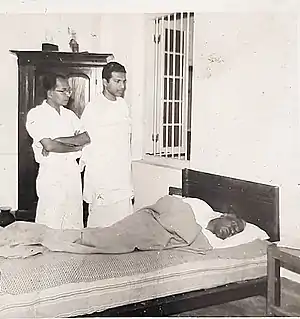J. E. Jayasuriya (14 February 1918 - January 1989) was a Sri Lankan educationist. He was the Professor of Education at the University of Ceylon.
Early life and education
Jayasuriya's father was a postmaster and the family moved when he was transferred from post office to post office. He received his education at Nawalapitiya Anuruddha Vidyalaya, Dharmasoka College, Ambalangoda and at Wesley College, Colombo. In 1933, he came third in the British Empire at the Cambridge Senior Examination gaining a scholarship to the University College, Colombo and graduate in 1939 with a first class in mathematics.[1][2]
Educational career
He accepted an invitation from P. de S. Kularatne to serve as acting principle of Dharmapala Vidyalaya, Pannipitiya and thereafter served as deputy principal of Sri Sumangala Vidyalaya, Hikkaduwa. He was then invited by the Minister of Education Dr C. W. W. Kannangara to become the principle of newly established central school in his electorate, the Matugama Central College, thereafter he served as principle of the Wadduwa Central College. In 1947 he left to London to for postgraduate studies at the Institute of Education of the University of London, gaining a Post Graduate Diploma in Education and a Master of Arts in education. On his return he joined the Government Teacher Training College, Maharagama as lecturer in mathematics. In 1952 he joined the Faculty of Education, University of Ceylon as a lecturer and in 1957 he succeeded Prof. T.L Green was appointed as Professor of Education. In 1961 he was appointed as the Chairman of the National Education Commission. He served as Dean of the Faculty of Arts and as acting Vice Chancellor until his retirement in 1971 to join UNESCO as the Regional Advisor in Population Education based in Bangkok. At the end of his contract he returned to Sri Lanka, where he spent his last days writing and researching. He died in January 1989. He has awarded an honorary Doctor of Letters from the University of Colombo and an honorary Doctor of Science from the Open University of Sri Lanka. He was a Chartered Psychologist.[3][4][5]
Political activism

Jayasuriya was a strong advocate of the making Sinhala the official language of Ceylon and to this end he was a strong supporter of S. W. R. D. Bandaranaike during the 1956 general election which Bandaranaike achieved a landslide victory. When Bandaranaike proposed to introduce a bill in parliament to making Sinhala the official language with administrative for Tamil, Jayasuriya and K. M. P. Rajaratne went on a fast and demanded legislation be drafted to make Sinhala the only official state with no concessions to Tamil language. Bandaranaike caved in drop the administrative provisions for Tamil and The Ceylon (Constitution) Order in Council was passed through parliament and was enacted.[6][7]
Books published
- Educational Policies and Progress during British Rule in Ceylon, 1796-1948
- Education in Ceylon Before and After Independence
- Dynamics of Nation Building in Malaysia; Education in Korea – A Third World Success Story
- Population Education through Curriculum Innovation
See also
References
- ↑ Kumarasinghe, S.H. "Prof. J. E. Jayasuriya: the epitome of Sri Lankan Education Philosophy". Sunday Times. Retrieved 9 May 2023.
- ↑ Perera. "Prof. J.E. Jayasuriya Visionary educationist and ideal teacher". Daily Mirror. Retrieved 9 May 2023.
- ↑ Jayasuriya, Dayanath. "J. E. Jayasuriya – Sri Lanka's Pioneer Educational Psychologist". The Island. Retrieved 9 May 2023.
- ↑ Sandarasegaram, S. "Prof. J. E. Jayasuriya - renowned Sri Lankan educationist". Daily News. Retrieved 9 May 2023.
- ↑ Medagama, R. S. "Prof. J. E. Jayasuriya - pioneering educationist with a vision". Daily News. Retrieved 9 May 2023.
- ↑ De Silva, K. M., & Wriggins, W. H. (1988). J. R. Jayewardene of Sri Lanka: a political biography.
- ↑ Krishnamurthi, J. "History of 'Fasts-unto-death'". Daily News. Retrieved 9 May 2023.